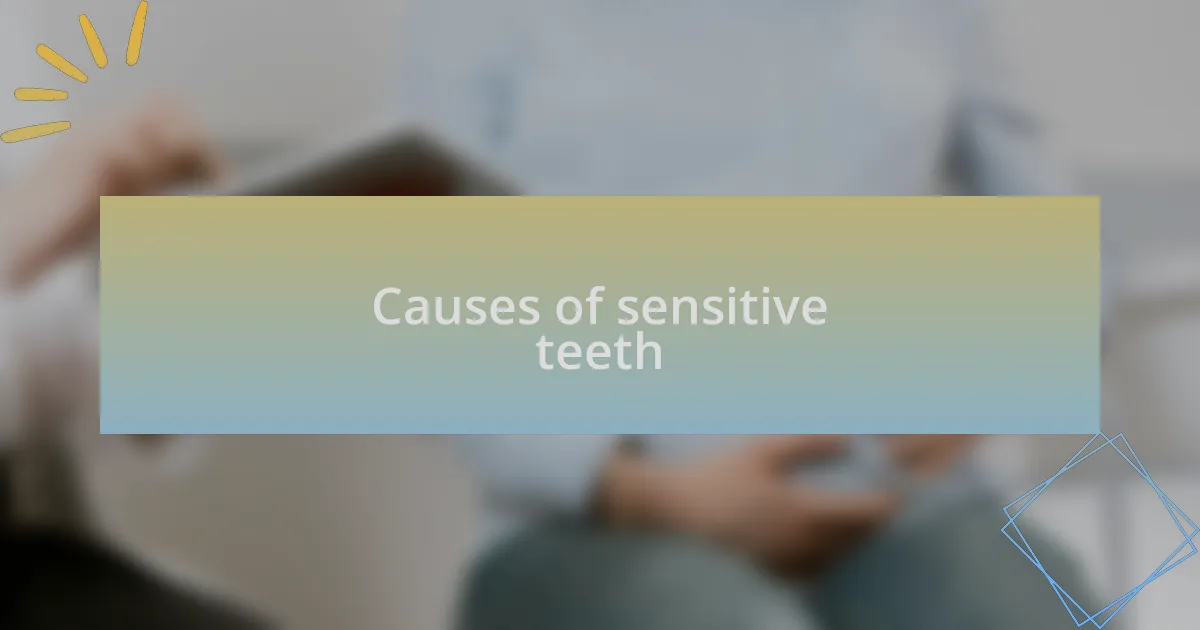Key takeaways:
- Sensitive teeth can result from causes like enamel erosion, gum recession, and dental procedures, leading to sharp pain from hot or cold stimuli.
- Treatment options include desensitizing toothpaste, fluoride treatments, and lifestyle changes, which can significantly alleviate discomfort.
- Choosing a dental clinic that specializes in sensitivity treatments enhances the patient experience through personalized care and modern technology.
- Managing sensitivity involves patience and proactive discussions with dental professionals, emphasizing the importance of regular check-ups and appropriate oral care products.

Understanding sensitive teeth
Sensitive teeth can feel like a personal betrayal. I remember a time when a sip of ice-cold water sent shockwaves through my mouth, making me wince in discomfort. It’s surprising how something so simple can disrupt your day and make you dread certain foods or drinks.
The sensation of sharp pain from hot or cold stimuli often stems from exposed nerve endings. This can happen for various reasons, such as worn enamel or gum recession. Have you ever noticed that certain activities, like brushing or even breathing in cold air, can trigger these sensations? I’ve been there, and it’s a constant reminder of how our teeth are not just tools for eating, but incredibly sensitive parts of our bodies.
Managing sensitivity is a journey that often requires a mix of awareness and adjustments. For example, I learned to avoid overly abrasive toothpaste and opted for softer-bristled brushes. It may seem small, but finding the right products significantly eased my discomfort. What strategies have you discovered to cope with your sensitive teeth?

Causes of sensitive teeth
Sensitive teeth can arise from several common causes, each having its unique impact on our well-being. One significant factor is enamel erosion, which I’ve experienced firsthand. After indulging in too many acidic foods, like citrus fruits and soda, I noticed my teeth became more sensitive to temperature changes. It’s surprising how simple dietary choices can set off such discomfort.
Gum recession is another culprit I’ve grappled with. Notice how your gums can barely cover the roots of your teeth when they shrink away? This exposure can lead to sharp pain, especially when consuming hot or cold beverages. There were moments when even sipping on warm tea felt like a gamble, pushing me to rethink my oral hygiene habits.
Lastly, dental procedures can contribute to sensitivity as well. After getting a filling, I remember the lingering discomfort that seemed to amplify everything I ate. It’s a reminder that while seeking solutions, we must sometimes endure temporary sensitivity as our teeth adjust. Have you ever experienced a similar reaction after a dental visit? It’s a frustrating cycle, but understanding these triggers is the first step toward managing the pain.

Treatment options for sensitive teeth
When it comes to treating sensitive teeth, desensitizing toothpaste has been a game changer for me. The first time I tried one, I was skeptical; could a simple paste really ease the sharp pangs I felt while enjoying ice cream? To my surprise, regular use reduced discomfort, making my favorite treat enjoyable again. It’s fascinating how these products work by gradually blocking the pathways that lead to the nerves.
Another effective option I’ve explored is fluoride treatments. I can still recall that serene moment at the dental office when my dentist applied fluoride varnish to my teeth. It was comforting to know that this extra layer of protection was promoting rejuvenation in my enamel. Has anyone else experienced that feeling of reassurance during a dental visit? The fact that fluoride can strengthen our teeth really resonates with me.
Finally, don’t underestimate the role of lifestyle changes. I started being more mindful of my diet and, wow, what a difference it made. Swapping out acidic drinks and incorporating more protective foods left me feeling empowered. Have you noticed how simple adjustments can enhance your dental health? Embracing these small changes can lead to significant improvements in managing sensitivity and making every bite enjoyable again.

My journey with sensitive teeth
Living with sensitive teeth has been quite the journey for me. I remember the day I bit into a slice of pizza, felt that jolt of pain shoot through my mouth, and realized I needed to address the issue. It’s almost bewildering how something as enjoyable as food can trigger so much discomfort, right?
One moment that stands out vividly is when I first noticed my sensitivity while sipping a hot cup of coffee. The sharpness was unexpected and left me frustrated. I often found myself avoiding my favorite beverages out of fear of that piercing ache. Have you ever held back from indulging in something you love because of fear? That’s exactly what I experienced, and I knew I didn’t want my dental sensitivity to dictate my choices.
Over time, I learned to appreciate the small victories. There was a moment when I drank cold water without flinching, and it felt liberating. I was reminded that managing sensitivity is about patience and discovering solutions that work for me. Has anyone else celebrated those little wins in their dental health journey? It’s encouraging to see progress, no matter how small!

Dental clinic recommendations
When choosing a dental clinic, I always recommend looking for a place that specializes in sensitivity treatments. During my search, I found clinics that offered tailored solutions, like desensitizing treatments and specialized toothpaste, which made a significant difference for me. Have you considered how personalized care could transform your experience as well?
I remember visiting a dental clinic where the staff took the time to listen to my concerns about sensitivity. Their empathy was refreshing, and it encouraged me to open up about my fears, something I think everyone should experience. This connection made my visits more comfortable, and it’s crucial to find a clinic that prioritizes genuine patient care.
Another important factor is the clinic’s use of modern technology. A facility that incorporates the latest diagnostic tools, like digital X-rays, can provide more accurate assessments of your dental health. I realized how much confidence I gained knowing my sensitivity was being managed with cutting-edge methods. Isn’t it reassuring to feel that your dental health is in skilled hands?

Tips for managing sensitivity
Finding ways to manage sensitivity can truly enhance your comfort when eating or drinking. One of the strategies that worked for me was using a toothpaste specifically designed for sensitive teeth. The first time I tried it, I was pleasantly surprised by how quickly I noticed a reduction in discomfort. Have you ever thought that switching your toothpaste could be that simple yet impactful?
Another tip that I highly recommend is being mindful of the temperature of your food and beverages. After I started avoiding very hot or cold items, the sensitivity noticeably lessened. It’s a small change, but it can make a big difference in your daily enjoyment of meals. Isn’t it interesting how something as small as temperature can influence our comfort?
Additionally, I’ve found that regular dental check-ups are crucial in managing sensitivity. I used to think of them as a chore, but now I see them as an opportunity to discuss my specific concerns with my dentist. Having open conversations about my sensitivity not only helps me stay informed about the best practices but also gives me peace of mind knowing I’m actively addressing the issue. How often do you take the time to connect with your dental professional about your experiences?

Conclusion on sensitive teeth experience
Managing sensitive teeth can be a journey filled with trial and error. I’ve experienced my fair share of frustration with different remedies, but finding the right toothpaste was a game-changer for me. It made me feel more in control of my dental health, and I often wonder how many others have yet to discover this simple solution.
During my experience, I realized it’s not just about finding physical relief; it’s an emotional process as well. The discomfort can sometimes feel isolating, especially when enjoying meals becomes a challenge. I often think about how many people might shy away from social interactions because of sensitivity. When these issues are acknowledged and discussed, it opens the door for support and shared strategies.
Ultimately, my approach has been about self-advocacy and patience. Regular check-ups and candid conversations with my dentist have led to breakthroughs in managing my sensitivity. Have you taken that step yet? It can be empowering to take charge of your oral health rather than leaving it to chance.